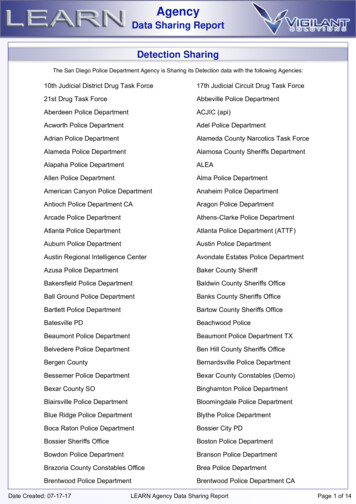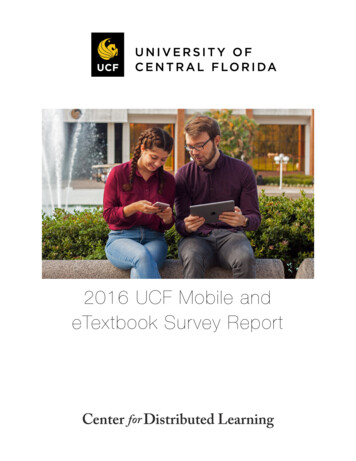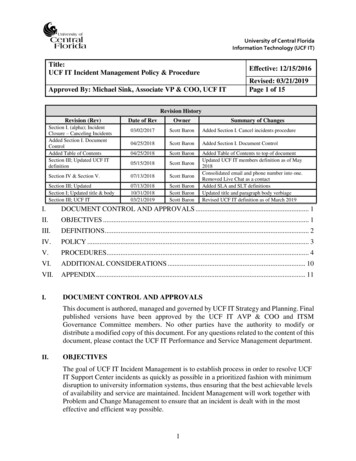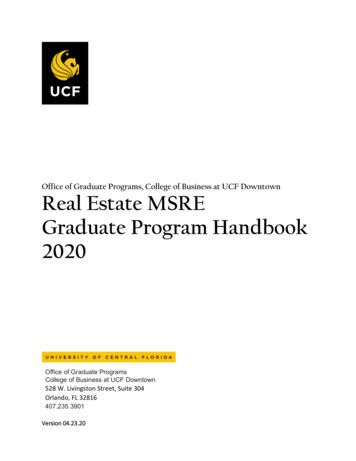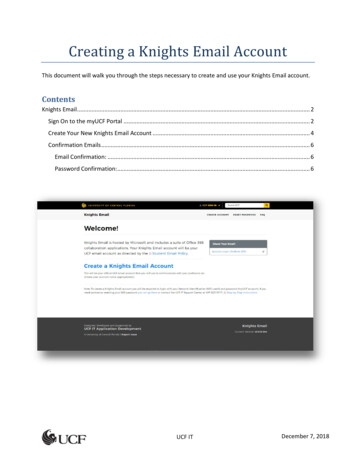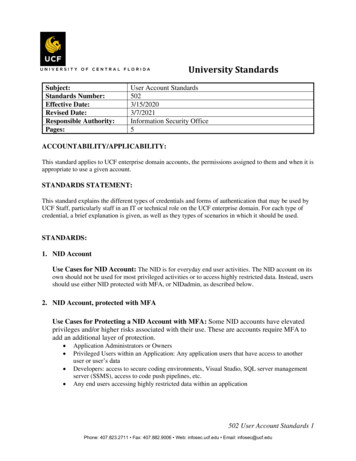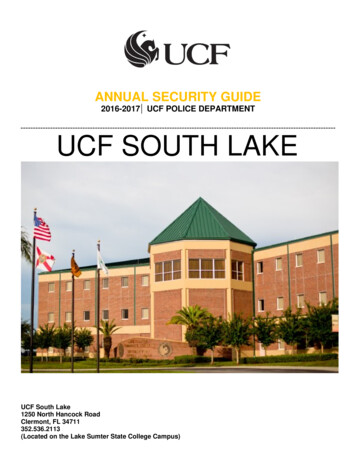
Transcription
ANNUAL SECURITY GUIDE2016-2017 UCF POLICE DEPARTMENTUCF SOUTH LAKEUCF South Lake1250 North Hancock RoadClermont, FL 34711352.536.2113(Located on the Lake Sumter State College Campus)
THE UNIVERSITYof CENTRAL FLORIDAKeeping our campus community safe for students, employees, and visitors is a top priority for theUniversity of Central Florida. Our staff members, faculty members, and administrators work diligently withthe UCF Police Department to ensure the best possible campus environment for academic, professional,and personal growth. UCF’s successful strategy for safety includes focusing on crime prevention, workingwith student and community organizations, and collaborating with area law enforcement agencies. Butyour help is also essential. Please read and follow the suggestions in this guide. Together, we canprevent crime on campus and make UCF a safe and welcoming place for everyone.John C. Hitt, PresidentThe UCF Police Department is an accredited, full service police department that serves the UCF community.The department, based on a community policing model, provides law enforcement services and crimeprevention assistance to students, faculty, staff members and visitors across UCF’s campuses.The UCF Police Department continues to grow with the needs of an expanding metropolitan researchuniversity and has adopted the cutting edge training and technology that prepares officers to respond to theunique needs of a university community. The department is staffed by well trained, well equipped andprofessional law enforcement officers and an exceptional support staff that is dedicated to fostering a safe,inclusive campus environment.The Annual Security and Fire Safety Guide is our way of increasing communication about crimeprevention and awareness. We also regularly provide educational programming to increase thecommunity’s safety and knowledge. Through training and other crime prevention resources, the UCFPolice Department has taken important steps to address sexual violence, dating violence, stalking,alcohol and drug misuse, theft and other crimes that are not unusual on college campuses acrossthe nation.I encourage you to use the information in this guide to promote your own personal safety and toassist us in keeping UCF safe and secure.Richard Beary, Chief of Police2
CAMPUS SECURITY & FIRE SAFETY STATISTICSThe Campus Security Act requires colleges and universities to: Publish an annual report by October 1 that contains three years of campus crime and fire statistics,certain campus security policies and fire prevention statements.Disclose crime statistics for campus, public areas immediately adjacent to or running through thecampus, non-campus facilities and remote classrooms.Issue campus alerts to provide the campus community with information necessary to make informeddecisions about their own health and safety.Publish on-campus housing fire statistics and fire drills from the previous year.Compile, prepare and distribute this report by working with local law enforcement and other universityofficials who have significant responsibility for student and campus activities.Members of the UCF community are encouraged to use this report as a guide for safe practices on and offcampus. The Annual Security and Fire Safety Guide is published by the UCF Police Department and isavailable online at http://police.ucf.edu/SafetyGuide/SouthLake/. The Police Department policy requirescampus crime data, relative to the Clery Act, be compiled electronically and submitted annually to the FederalDepartment of Education. Crime statistics are gathered for buildings owned or controlled by UCF that are usedfor institutional and educational purposes, as well as public property within or immediately adjacent to andaccessible from the campus. This data is compiled through reports made to the UCF Police Department andother law enforcement agencies. For a printed copy of this report, please visit the UCF Police Departmentlocated at 3610 Libra Drive, Orlando, FL 32816, or one may be requested by contacting clery@ucf.edu.UCF POLICE DEPARTMENTMISSION, VALUES, VISION & GOALSMISSIONThe University of Central Florida Police Department provides high-quality, professional crime prevention,protection, and law enforcement services to maintain and promote human safety and the security of propertyfor the UCF campus and its associated locations. The Department facilitates the achievement of theacademic, research, and public service mission of the university through its safety and security programs, theprotection of individual rights, and reducing the fear of crime.This mission is accomplished through the direct provision of traditional law enforcement and emergencyservices, and the design and delivery of proactive educational, outreach and crime prevention programs for abroad and diverse campus community. The UCF Police Department maintains excellent working relationshipswith local law enforcement agencies, including but not limited to Clermont Police Department, Lake CountySheriff’s Office, Florida Highway Patrol and the Florida Department of Law Enforcement. Criminal activity at offcampus locations involving student organizations officially recognized by UCF are monitored and recordedthrough local law enforcement agencies.Additionally, the UCF Police Department provides services, develops programs, and trains its sworn andcivilian staff members with sensitivity to the unique concerns of the university community. UCF police officersenforce federal laws, Florida state laws, local ordinances and institutional policies. Under the provisions ofFSS 1012.97 UCF Police are declared to be law enforcement officers of the state and conservators of thepeace and have the right to arrest, in accordance with the laws of this state, any person for violation of statelaw or applicable county or city ordinances when such violations occur on or within 1,000 feet of any propertyor facilities that are under the guidance, supervision, regulation, or control of the state university, a directsupport organization of such university, or any other organization controlled by the state university, or when3
such violations occur within a specified jurisdictional area as agreed upon in a mutual aid agreement enteredinto with another law enforcement agency.VALUESIn carrying out its stated mission, all members of the department strive to embrace the following core values: Accept responsibility for our actions. Exhibit respect for the individual. Maintain open lines of communication within the community and the department. Ensure fairness to those we serve and with whom we work. Demonstrate a commitment to excellence. Solve problems in the community. Demonstrate sensitivity to differing points of view.VISIONThe UCF Police Department will grow with the needs of an expanding metropolitan university. The UCF PoliceDepartment will augment services for commuting students and students residing on campus. Throughcontinued documentation, review, and planning, the Department will be cognizant of services that are requiredby the university. Those services will be provided by a well-trained, well-equipped, and professional lawenforcement department.GOALS Increase police coverage for the university community by expanding programs currently offered andadding new services as required. Increase communications by routinely publishing information on crime prevention and awareness, andby providing educational programs to increase the community’s knowledge and safety as it relates topolice services. Meet the challenges of maintaining and improving law enforcement services by aggressively seeking,employing, and retaining high-quality law enforcement professionals. Continually train all officers to be knowledgeable of current laws and procedures. Ensure that the Department’s members represent the constituency it serves and do not discriminate. Maintain and upgrade communications, alarm and surveillance systems, patrol vehicles, and otherpolice equipment needed to effectively provide comprehensive police service.UCF is committed to providing a safe working and learning environment, for the protection of all members ofthe University community and to ensure compliance with federal legislation. UCF has developed aComprehensive Emergency Management Plan (CEMP), which outlines key operationalresponsibilities in the event of an emergency on campus. Emergency response and evacuationprocedures are identified in the CEMP, and are to be followed in the event of a campus emergency.The CEMP identifies key emergency support responsibilities as coordinated with the appropriateUCF Departments, as well as local, State, and Federal agencies. The CEMP is available atwww.emergency.ucf.edu. Additionally, Lake Sumter State College has a CEMP that also providesevacuation procedures should you receive an emergency alert from their system. The rtments/Facilities/EmergencyPlan.aspx.WHAT IS A UCF ALERT?UCF Alert is a multimedia communication system that provides timely and accurate information aboutemergency situations that could impact the University and is activated primarily for life safety situations.4
The UCF Police Department, Lake Sumter State College Administration, UCF Office of EmergencyManagement, and UCF News & Information determine which communication tools will be used during anemergency. If these departments receive information about an immediate threat to the campus, they willconfirm that a threat exists, determine the appropriate segment or segments of the campus community toreceive the information, if the threat is limited to a certain building or segment, as well as determine thecontent of the notification and initiate some or all of the notification systems as described below. These entitieswork together to provide timely and accurate information to the UCF community. All incidents will be evaluatedon a case-by-case basis to determine if a serious or ongoing threat to the community exists. For example, ifan assault occurs between two students who have a disagreement, there may be no ongoing threat to otherUCF community members and a UCF Alert would not be distributed. In cases involving sexual assault, theyare often reported long after the incident occurred, thus there is no ability to distribute a UCF Alert to thecommunity. Sex offenses will be considered on a case-by-case basis depending on when and where theincident occurred, when it was reported, and the amount of information known by the UCF Police.Officials at UCF South Lake will notify the UCF Police Department of a serious or ongoing threat viathe UCF Police Department’s Clery Hotline 407-823-0595. UCF will immediately notify the campuscommunity, upon the confirmation of a significant emergency or dangerous situation occurring onUCF’s campuses, which involve an immediate threat to the health or safety of students, faculty, andstaff so that they may take reasonable precautions for safety, unless the notification at that time willcompromise efforts to contain the emergency. Only authorized personnel can operate, activate, or de-activatethe UCF ALERT System. Each individual who has the authority to activate the UCF ALERT system has theresponsibility of ensuring that it is activated primarily for life safety situations and is not used for routinenotifications. Depending on the scale and type of emergency, some or all systems will be used for emergencynotifications. The deactivation of the UCF ALERT system will be done in stages, depending on the scale andtype of emergency. A large-scale emergency will require that some UCF Alert systems remain active until theentire UCF community is aware of its current status. For example: the UCF Emergency Home Page may beused to provide information to faculty and staff members and students after the campus has been deemedsafe by the appropriate authority. Incidents which prompt a UCF Alert include, but are not limited to: Any of the Clery Reportable Crimes (murder and non-negligent manslaughter, negligentmanslaughter, forcible sexual offenses, robbery, aggravated assault, burglary, motor vehicletheft and arsonAn outbreak of a serious illnessApproaching tornado, hurricane or other extreme weather conditionEarthquakeGas leakTerrorist incidentArmed intruderBomb threatCivil unrest or riotingExplosionNearby chemical or hazardous waste spillUCF Alert features several communication tools, including emails, text messages, web updates, social media,sirens, and more (see full notification list below). These notification procedures are tested on an annual basis.These tests will be announced OR unannounced. In accordance with federal law, a summary of atleast one test will be published on an annual basis.At all times, the best source for official news and information is the UCF website www.ucf.edu.Members of the larger community, such as parents or campus neighbors can visit the UCF websiteto receive campus emergency information. The site will be updated during an emergency asinformation becomes available. Follow-up information pertaining to emergencies on campus will bedisseminated using some or all of the notification systems described below.5
For questions about UCF Alert and how it is used, contact the UCF Office of EmergencyManagement at 407-882-7111.PRIMARY NOTIFICATIONSThese are the primary and immediate ways the campus community will be notified about an emergency oncampus:UCF Emergency Home Page (ucf.edu): The UCF home page will become the UCF Emergency home pageduring a major emergency and will provide updates, instruction, and information to the UCF community. TheChief of Police, the Deputy Chief of Police, the Police Supervisor on duty, the Senior Police Dispatcher onduty, and the Director of Emergency Management, or designee, have the authority to create messages for thissystem. The Director of News and Information, the Associate Vice President for Communications and PublicAffairs, and the Senior Communications Coordinator for News and Information have the authority to sendmessages using this method.Sirens (Giant Voice and Speaker Sirens): There are indoor and outdoor sirens on campus. These sirens willproduce a tone followed by a voice message. The Chief of Police, the Deputy Chief of Police, the PoliceSupervisor on duty, the Senior Police Dispatcher on duty, and the Director of Emergency Management, ordesignee, have the authority to create messages for this system. Police Dispatchers, the Director ofEmergency Management, the Emergency Management Logistics and Administration Specialist, theEmergency Management Plans and Programs Coordinator, and the Emergency Management Training andExercise Coordinator have the authority to send messages using this system.SMS Text Messaging: If you did not opt out, you will receive emergency notification via a text message onyour cellphone. The Chief of Police, the Deputy Chief of Police, the Police Supervisor on duty, the SeniorPolice Dispatcher on duty, and the Director of Emergency Management, or designee, have the authority tocreate messages for this system. Police Dispatchers, the Associate Vice President for Communications andPublic Affairs, the Director of Emergency Management, the Director of News and Information, the EmergencyManagement Logistics and Administration Specialist, the Emergency Management Plans and ProgramsCoordinator, the Emergency Management Training and Exercise Coordinator, and the SeniorCommunications Coordinator for News and Information have the authority to send messages using thissystem.Email: If you did not opt out, you will receive an email to any email account provided on your emergencycontact information. If you do not have an email address, sign up for a free Knight’s email account. The Chiefof Police, the Deputy Chief of Police, the Police Supervisor on duty, the Senior Police Dispatcher on duty, andthe Director of Emergency Management, or designee, have the authority to create messages for this system.Police Dispatchers, the Associate Vice President for Communications and Public Affairs, the Director ofEmergency Management, the Director of News and Information, the Emergency Management Logistics andAdministration Specialist, the Emergency Management Plans and Programs Coordinator, the EmergencyManagement Training and Exercise Coordinator, and the Senior Communications Coordinator for News andInformation have the authority to send messages using this system.NOAA Weather Radios: UCF has National Oceanic and Atmospheric Administration (NOAA) programmableweather radios distributed throughout the campus. In the event of severe weather, these radios willautomatically sound the appropriate warning message. The National Weather Service Melbourne creates thecontent and activates messages sent using this system.SECONDARY NOTIFICATIONSThese are other options UCF may use to keep the campus community informed of current events regardingan emergency on campus. Individual or all systems will be used depending on the scale and size of theemergency.HEARO Radios: These desktop radios have been placed throughout the UCF campus and allow Emergency6
Management to be able to send scrolling text to them during an emergency. The Chief of Police, the DeputyChief of Police, the Police Supervisor on duty, the Senior Police Dispatcher on duty, and the Director ofEmergency Management, or designee, have the authority to create messages for this system. The Director ofEmergency Management, the Emergency Management Logistics and Administration Specialist, theEmergency Management Plans and Programs Coordinator, and the Emergency Management Training andExercise Coordinator have the authority to send messages using this system.UCF Main Phone Line (407-823-2000): Recorded messages of current events and instructions will be postedhere. The Chief of Police, the Deputy Chief of Police, the Police Supervisor on duty, the Senior PoliceDispatcher on duty, and the Director of Emergency Management, or designee, have the authority to createmessages for this system. The Associate Vice President for Communications and Public Affairs, the Directorof Emergency Management, the Director of News and Information, the Emergency Management Logistics andAdministration Specialist, the Emergency Management Plans and Programs Coordinator, the EmergencyManagement Training and Exercise Coordinator, and the Senior Communications Coordinator for News andInformation have the authority to send messages using this system.Two-way Radios: Employees on campus who utilize two-way radios for routine business (police, facilityoperations, housing) will also receive alerts and warnings via their radios from their home office. The Chief ofPolice, the Deputy Chief of Police, the Police Supervisor on duty, the Senior Police Dispatcher on duty, andthe Director of Emergency Management, or designee, have the authority to create messages for this system.The Director of Emergency Management, the Emergency Management Logistics and AdministrationSpecialist, the Emergency Management Plans and Programs Coordinator, and the Emergency ManagementTraining and Exercise Coordinator have the authority to send messages using this system.Vehicle Public Address Speaker: When an isolated or targeted message may be required, Universityvehicles equipped with public address speakers (e.g. UCF Police vehicles) may utilize this method. The Chiefof Police, the Deputy Chief of Police, the Police Supervisor on duty, the Senior Police Dispatcher on duty, andthe Director of Emergency Management, or designee, have the authority to create messages for this system.Police Officers, the Director of Emergency Management, the Emergency Management Logistics andAdministration Specialist, the Emergency Management Plans and Programs Coordinator, and the EmergencyManagement Training and Exercise Coordinator have the authority to send messages using this system.Media Release or Press Conference: Depending on the nature and severity of the emergency, the localmedia may post breaking news or periodic updates regarding an emergency at UCF. The Chief of Police, theDeputy Chief of Police, the Police Supervisor on duty, the Director of Emergency Management, the Director ofNews and Information, the Associate Vice President for Communications and Public Affairs, the SeniorCommunications Coordinator for News and Information, the Associate Vice President for Administration andFinance, the University President, the Provost and Executive Vice President, and the Vice President forAdministration and Finance have the authority to create messages and send messages using this system.Radio (89.9 WUCF): Depending on the nature and severity of the emergency, WUCF and local radio newsstations may carry live breaking news or periodic updates regarding an emergency on campus. Their websitesmay also carry live streaming audio, audio clips, or text updates. The Chief of Police, the Deputy Chief ofPolice, the Police Supervisor on duty, the Senior Police Dispatcher on duty, and the Director of EmergencyManagement, or designee, have the authority to create messages for this system. The WUCF, Director ofRadio and TV has the authority to send messages using this system.Facebook: Keep up with UCF news and also receive notifications through www.facebook.com/ucf. The Chiefof Police, the Deputy Chief of Police, the Police Supervisor on duty, the Senior Police Dispatcher on duty, andthe Director of Emergency Management, or designee, have the authority to create messages for this system.The Director of News and Information, the Associate Vice President for Communications and Public Affairs,and the Senior Communications Coordinator for News and Information have the authority to send messagesusing this system.7
Twitter: Keep up with UCF news and also receive emergency notifications through www.twitter.com/ucf. TheChief of Police, the Deputy Chief of Police, the Police Supervisor on duty, the Senior Police Dispatcher onduty, and the Director of Emergency Management, or designee, have the authority to create messages for thissystem. The Director of UCF Marketing or designee has the authority to send messages using this system.WHAT SHOULD I DO WHEN I RECEIVE AN EMERGENCY NOTIFICATION?This will depend on the message that you receive, where you are at the time and the emergency situation. Ifyou are on campus and hear or received on the following, please obey these instructions:Building Evacuation Procedures: Leave building immediately when an alarm sounds or if you are instructed to do so by authorizedemergency personnel Notify others on your way out Turn off equipment Secure hazardous operations, if possible Take important personal items Close doors behind the last person out Walk quickly to the nearest safe exit Do not use elevators, unless authorized emergency personnel tell you to do so Do not re-enter the building until authorized emergency personnel give the “All Clear” signal Report any missing or trapped persons to authorized emergency personnel Move away from the building Go to your evacuation meeting site and sign in Notify emergency personnel if anyone is waiting for assistanceEven if you were not in your building when it was evacuated, go to your evacuation meeting site sosomeone can account for you.If you are required to leave the building immediately but are unable to do so because of a physicaldisability, injury or obstruction: Go to the nearest area where there are no hazards, such as a stairwell Notify University Police at 911 Signal out the window to emergency responders, if possible Remain calm, responders will arrive Instructors and supervisors should be proactive and be aware of people who will need assistance.Assisting Blind/Visually Impaired: Clearly announce the type of emergency Offer your arm for guidance Tell the person where you are going and alert him/her to obstacles along the wayAssisting Deaf/Hearing Impaired: Turn lights on and off to gain the person’s attention Indicate directions with gestures or a written noteAssisting Mobility-Impaired/Wheelchair Users: Elevators should not be used to move people with disabilities Seek volunteers to assist students/personnel with physical disabilities to the nearest enclosedstairway or designated areas for rescue assistance One individual should remain with the person(s), if it can be done without unreasonable personalrisk Others should advise emergency personnel of the location so that the evacuation can becompleted8
If an imminent danger situation exists and the person requests assistance in evacuation beforeemergency personnel can arrive, assist in finding volunteers to evacuate the person per his/herinstructionsSHELTER IN PLACE: WHAT IT MEANS TO SHELTER IN PLACESheltering in place provides protection from external hazards, minimizes the chance of injury, and/or providesthe time necessary to allow for a safe evacuation. This should be done by selecting a small, interior room ifpossible, with no or as few windows as possible. When authorities issue directives to shelter-in-place, do notwalk outdoors, take refuge indoors immediately.A shelter in place order may be issued for several reasons: Active Shooter Severe weather Hazardous materials Civil Unrest Hostage situation Or any situation where it is best for you to stay where you are to avoid any outside threatWhen a shelter in place notification occurs: Remain CALM Faculty should recommend to students and others not to leave or to go outside If you are in dorm rooms, remain there Select a small interior room with no or few windows as possible Close and lock all windows, exterior doors, and any other openings that lead to the outside Stay away from all windows, doors Facilities Management personnel or trained Crisis Coordinators should shut down all buildingventilation fans and air conditioners, when and if appropriate If you are told there is danger of explosion, close the window shades, blinds, or curtains Select interior room(s) above the ground floor, with the fewest windows or air vents Room(s) should have adequate space for everyone to be able to sit down comfortably Avoid overcrowding by selecting several rooms when necessary.For severe weather and civil unrest: Stay inside and move away from windows Close and lock all exterior doors and offices For extreme weather, relocate to lower levels in the buildingFor external chemical, biological or radiological incidents: Stay inside and move to an inner corridor or office Facilities Management personnel or trained Crisis Coordinators may shut down all buildingventilation fans and air conditioners, when necessary and appropriate Since many chemical agents are heavier than air, and tend to hold close to the ground move tohigher levels of the building if possible to reduce the transfer of contaminated air from outside toinside Remain alert for instructions and updates as they become available from the emergencypersonnel and University administratorsVICTIM SERVICESOur mission is to collaborate with and empower organizations and individuals to eliminate violence in ourcommunity through advocacy, education and training.9
Victim advocate services are free and available 24/7 to students, faculty, staff, and visitors. An advocate canbe reached by calling our 24/7 crisis hotline at 407-823-1200. Victim advocates are available to assist with avariety of issues arising as a direct result of a crime, violence, or abuse – with or without a police report. Ouradvocates also respond in person to specific locations off campus on a case-by-case basis.SERVICES Crisis intervention Emotional support Reporting and disclosure options Personal advocacy Assistance filing injunctions for protection Safety planning Non-emergency campus medical appointments Referrals to on and off campus resourcesIn addition to intervention services, Victim Services hosts special events and presentations to promote andeducate the campus community, and to promote the awareness of rape, acquaintance rape, and other forcibleand non-forcible sexual offenses, as well as violence prevention and bystander intervention.Additional information regarding services, events and programs offered by the UCF Victim ServicesDepartment can be found by visiting the UCF Victim Services website at http://victimservices.ucf.edu/.SEX OFFENSESIf you or someone you know has been directly impacted by sexual violence and you are unsure aboutreporting to the police, please contact an advocate via our 24/7 crisis hotline at 407-823-1200. Victimadvocates can provide immediate assistance and support, as well as offer specific options and resources.Recommendations for Survivors of Sexual Violence Call the 24/7 HOTLINE at 407-823-1200 Consider filing a police report (recommended but not required) Do not change your clothing Do not wash your body or clothes (saving clothing items, sheets, etc. can provide important evidenceeven if you delay reporting or disclosing) Do not alter/change the scene of the crime Address health concerns as soon as possible (advocates can assist with related medical appointmentson campus or off campus at the UCF Health Center 407-823-3850, or the local Sexual AssaultTreatment Center 407-254-9415) Victim advocates will assist with notifying the UCF Police Department or local police if requested by thevictim Remember that support and assistance are only a phone call awayVictim Services Contact Information24/7 HOTLINE: 407-823-120012201 Research Parkway, Suite 450Orlando, FL 32826Main Office: 407-823-2425Office Hours: Monday – Friday 8 a.m. to 4:30 p.m.www.victimservices.ucf.edu10
THE CAMPUS SEX CRIMES PREVENTION ACT(Section 1601 of Public Law 106-386) is a federal law enacted on October 28, 2000, which provides forthe tracking of convicted, registered sex offenders enrol
2016-2017 UCF POLICE DEPARTMENT . UCF SOUTH LAKE. UCF South Lake 1250 North Hancock Road Clermont, FL 34711 352.536.2113 (Located on the Lake Sumter State College Campus) . UCF Alert features several communication tools, including emails, text messages, web updates, social media,
